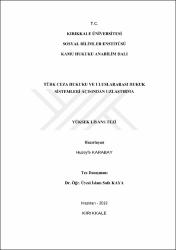| dc.contributor.advisor | Kaya, İslam Safa | |
| dc.contributor.author | Karabay, Huzeyfe | |
| dc.date.accessioned | 2021-01-16T18:58:36Z | |
| dc.date.available | 2021-01-16T18:58:36Z | |
| dc.date.issued | 2019 | |
| dc.identifier.uri | | |
| dc.identifier.uri | https://hdl.handle.net/20.500.12587/15147 | |
| dc.description | YÖK Tez ID: 568885 | en_US |
| dc.description.abstract | Onarıcı ceza adalet sistemi, suç fiilinin yol açtığı hasarların ve kayıpların giderilmesini amaçlamakta, bu yönüyle geleneksel ceza adalet sisteminin aksine mağdurun süreçten mümkün olduğunca tatmin olmasını hedeflemektedir. Geleneksel ceza adalet sistemi, yalnızca faili cezalandırma üzerine kuruludur. Onarıcı adalet, faili cezalandırmaktan çok uyuşmazlığın taraflarının memnun olduğu bir mutlak adaleti sağlamaya çalışmaktadır. Uzlaştırma, bugün dünyada bilinen en yaygın onarıcı adalet yöntemidir. Anglo-Sakson temelli bir kurum olan uzlaştırma, mağdur ile şüpheli arasında mücadeleci sistem anlayışının bir yansıması olarak kendisini göstermektedir. 1970'li yıllarda mağdur merkezli Anglo-Sakson ceza hukukunun bir görünümü biçiminde Kanada'da ve Amerika Birleşik Devletleri'nde denenen uzlaştırma uygulamaları, kurumun gelişmesinde öncü rol oynamış, ilerleyen yıllarda birçok ülkeye kurumun ihracı sağlanmıştır. Türkiye'de 2005 yılından bu yana uygulanan uzlaştırma kurumu, özellikle 26.11.2016 tarih ve 6763 sayılı kanunla yapılan değişiklikle işlevselliğini arttırmıştır. Ülkemizde uzlaştırmacıların kontrolünde yürütülen uzlaştırma müzakereleri sonucunda birçok uyuşmazlık yargılama makamlarını meşgul etmeksizin çözülmektedir. Bu da kuşkusuz yargının iş yükünü ve yargılama masraflarını azaltmakta; failin ve mağdurun uzun süren yargılamalarla karşı karşıya kalmasını önlemektedir. Anglo-Sakson ülkelerinde ceza adaleti makamlarına geniş takdir yetkisi veren maslahata uygunluk ilkesi, bu ülkelerde uzlaştırma uygulamalarını sisteme çabuk bir şekilde adapte etmiştir. Kıta Avrupası ülkelerindeyse; ceza hukuku sisteminin belirleyici özelliklerinden olan kanunilik ilkesi ve kovuşturma mecburiyeti ilkesi, uzlaştırmanın Anglo-Sakson ülkelerine nazaran daha yavaş ilerlemesine neden olmuştur. İslam öncesi Arap toplumunda "wasta" kelimesiyle özdeşleştirilen uzlaştırma, İslam ile birlikte "sulh" kelimesiyle anılmaya başlanmıştır. Sulh; nefret ve düşmanlığa son verme, ıslah, daha iyi ve faydalı hâle getirme anlamlarını karşılamaktadır. Kuran'da iki Müslüman topluluğun çatışması halinde çatışmanın tarafı olmayanlara bu grupların barıştırılması ve uzlaştırılması emredilmiş; çatışmanın tarafı olanlardan gerekirse fedakârlık yaparak ihtilafı sonlandırmaları istenmiştir. Sulh, İslam'da özellikle tavsiye edilen bir müessesedir. Geçmişte Osmanlı Devleti'nde de uygulanan sulh, şeriatın hüküm sürdüğü İslam ülkelerinde uyuşmazlıkların çözümü için hâlihazırda uygulanmaktadır. Anahtar Sözcükler: Uzlaştırma, onarıcı adalet, Anglo-Sakson, Kıta Avrupası, İslam hukuku, Türk ceza hukuku | en_US |
| dc.description.abstract | The restorative criminal justice system aims to eliminate the damages and losses caused by the criminal act and, in this respect, aims at satisfying the victim as much as possible from the process as opposed to the traditional criminal justice system. The traditional criminal justice system is based only on perpetrator punishment. Restorative justice, rather than punishing the perpetrator, is trying to provide an absolute justice in which the parties to the dispute are satisfied. Reconciliation is the most common restorative justice method known in the world today. The reconciliation is an Anglo-Saxon-based institution, reflects itself as a reflection of the concept of a combatant system between the victim and the suspect. In the 1970s, in the form of a victim-centered Anglo-Saxon criminal law, the conciliation practices in Canada and the United States played a leading role in the development of the institution, and in the following years, the institution was exported to many countries. The reconciliation institution implemented since 2005 in Turkey. The reconciliation increased its functionality in Turkey with the amendment made by Law No. 6763 on 26.11.2016. As a result of the reconciliation negotiations conducted under the control of mediators in our country as many disputes are resolved without diversion to the judicial authorities. This, of course, reduces the workload and judicial costs of the judiciary and prevents the perpetrator and the victim from facing lengthy trials. In Anglo-Saxon countries, the power of discretion to the criminal justice, which gives wide discretion to the authorities, adapted the reconciliation practices in these countries to the system quickly. In Continental European countries; the principle of lawfulness and the principle of prosecution, which is one of the defining characteristics of the criminal law system, caused the reconciliation to progress more slowly than the Anglo-Saxon countries. In the pre-Islamic Arab society, the reconciliation associated with the word "wasta" began to be called "sulh" with Islam. "Sulh" means to end hate and hostility. In the event of a conflict between the two Muslim communities in the Qur'an, these groups were ordered to be reconciled. "Sulh" is a particularly recommended institution in Islam. In the past, "sulh" was applied in the Ottoman Empire. In Islamic countries, where the shari'ah prevails, "sulh" is currently being implemented to resolve disputes. Keywords: Reconciliation, restorative justice, Anglo-Saxon, Continental Europe, Islamic law, Turkish criminal law | en_US |
| dc.language.iso | tur | en_US |
| dc.publisher | Kırıkkale Üniversitesi | en_US |
| dc.rights | info:eu-repo/semantics/openAccess | en_US |
| dc.subject | Hukuk | en_US |
| dc.subject | Law | en_US |
| dc.title | Türk ceza hukuku ve uluslararası hukuk sistemleri açısından uzlaştırma | en_US |
| dc.title.alternative | Reconciliation in terms of turkish criminal law and international legal systems | en_US |
| dc.type | masterThesis | en_US |
| dc.contributor.department | KKÜ, Sosyal Bilimler Enstitüsü, Kamu Hukuku Anabilim Dalı | en_US |
| dc.identifier.startpage | 1 | en_US |
| dc.identifier.endpage | 196 | en_US |
| dc.relation.publicationcategory | Tez | en_US |
















